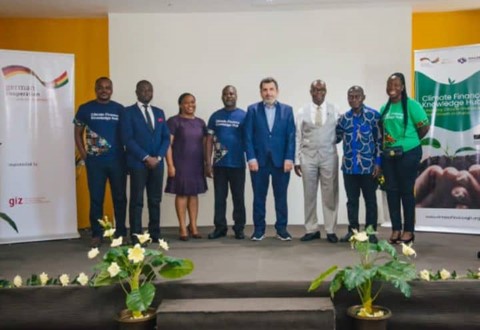The Ghana Microfinance Institution Network (GHAMFIM) in partnership with Deutsche Gesellschaft für Internationale Zusammenarbeit (GIZ) has set up a Climate Finance Knowledge Hub (CFKH), with the aim of providing essential tools and knowledge to enable Microfinance Institutions (MFIs) and climate – smart enterprises to thrive in an eco-conscious manner.
The CFKH launch took place in Accra under the theme ‘Climate Finance Knowledge Hub – Enhancing Climate for MSME Growth in Ghana’.
Objectives of the Knowledge Hub, which was birthed in 2019, are to train MFIs and Micro, Small and Medium Scale Enterprises (MSMEs) to evaluate chains for climate-smart businesses, analyse business risks and value green businesses.
It also aims to provide MFIs with institutional certification and training for tried and tested climate-smart business strategies; establish a digital platform with a database of recognised climate enterprises and green finance groups; and to locate funding options for green businesses.
Speaking at the event, Head-Programme for support to the Private and Financial Sector (PFS), GIZ Ghana, Dr. Christian Jahn said that CFKH is not just a platform but a catalyst for changing MFIs and climate-smart businesses across Ghana.
“The impact of this initiative is expected to be profound. The knowledge acquired through this e – learning platform has potential to offer financial institutions grounded capacity to effectively conduct detailed value chain analysis and risk assessment of MSMEs businesses, so as to make strategic and data-driven decisions when approving credit facilities for climate-smart businesses,” he said.
He said CFKH seeks to be a pillar in the promotion of sustainable financial practices to drive climate innovation forward.
According to Dr. Jahn, MSMEs form the backbone of Ghana’s economy – employing over 80 percent of the workforce and contributing over 70 percent of gross domestic product (GDP), yet facing unprecedented challenges in the wake of climate change.
Quoting a report from the United Nations, he noted that extreme weather events have increased over the past two decades – affecting businesses and communities and resulting in US$2.97trillion of global economic losses.
“These are not just numbers, these are lives, livelihoods and dreams at stake,” he fumed.
However, Dr. Jahn stressed that the CFKH will also elevate Ghana’s international standing by opening doors to new markets and encouraging investments in climate-friendly projects, and also help cultivate a skilled workforce committed to sustainability and resilience.
Deputy Chief Executive Officer-Development Bank Ghana (DBG), Michael Mensah-Baah – who was a guest speaker at the launch, indicated that even though Africa produces less carbon compared to the rest of the world, the continent suffers most from climate change’s effects.
“Over the past three decades, sea levels have increased on the African continent more than they have globally.”
Southern and Eastern Africa are predicted to have higher tropical wind speeds and more category 4 – 5 cyclones. The Sahara, Horn of Africa and Central Africa are projected to face heavier rainfall and accompanying increases in pluvial flooding.
He noted that the DBG’s vision is to accelerate an inclusive and sustainable economic transformation by fostering the growth of a competitive private sector.
Mr. Mensah-Baah added that the CFKH will provide opportunity for stakeholders to benefit from the soon-to-be- be-established Development Bank Green Finance Investment Facility (DBG – GFIF), which is aimed at addressing the barriers and market gaps associated with financing climate projects.










